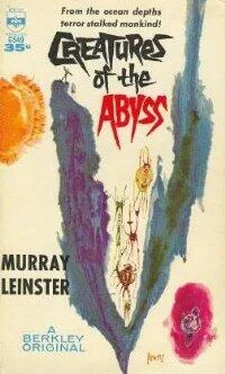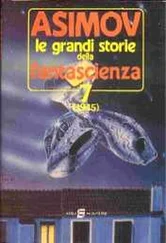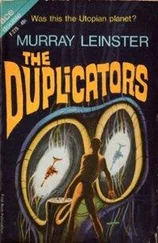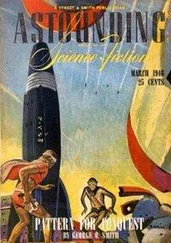Davis joined Deirdre and Terry. Before Davis could speak she said, “I can’t imagine any guess that will add everything together, Terry.” Davis made a jerky gesture.
“Today’s business is beyond all reason,” he said unhappily, “and if there ever was an understatement, that’s it! If there can be any conceivable motive for the plastic objects, which the Pelorus dismisses as hoaxes, the motive is to use them to find out something about surface conditions; that is, for surface conditions to be reported back. And that’s not easy to imagine. But try to think of something easier! And yet, such mindless ferocity as attacked the bathyscape… that wouldn’t be curious about the surface!”
“No-o-o-o,” agreed Terry. “It wouldn’t. But we’d set off a bomb down below to stir things up. A couple of hours later the bathyscaphe went down. A stupid and merely ferocious thing of the depths wouldn’t associate a bomb that exploded with a bathyscaphe that came down two hours later. It took intelligence to make the association of two falling objects with danger.”
Deirdre beamed suddenly.
“Of course! That’s it! Go on!”
“Curiosity implies intelligence,” said Terry carefully, “and intelligence is a substitute for teeth or claws. We don’t assume that the fish that carry the plastic gadgets made them. Why assume that whatever attacked the bathyscaphe did it of its own accord? We believe that something else makes the deep-sea fish come up into the Thrawn Island lagoon, don’t we? Or do we?”
“We pretend we don’t,” said Deirdre.
Davis nodded reluctantly.
“Yes, we pretend we don’t,” he agreed. “But if intelligence is involved, I find myself getting frightened! We humans are always terrified of strange types of intelligence, anyhow. If it’s intelligence that isn’t human …”
Nick came up from below.
“Thrawn Island calling,” he reported. “They say the hum at the lagoon opening stopped for some forty-odd hours and then started again. They ask if we’re coming. I said we were on the way. They’re standing by. Anything we should tell them?”
“We’ll get there some time after sunset,” said Davis.
“And maybe you should tell them about the Pelorus and the bathyscaphe.”
Nick grinned briefly. “I did. And the guy on Thrawn Island said ‘Hooray’ and then explained that he said that because he couldn’t think of anything that fitted the idea of something biting holes in three-inch steel.” He added, “I can’t think of a proper comment, either.”
“We’ll get to Thrawn Island after sunset,” repeated Davis. “Then we’ll see what we find in the lagoon—if anything.”
Nick started back toward the bow. He stopped.
“Oh, yes! It wasn’t a scientific guy talking, just the short-wave operator. The science staff is all busy. He said they heard an hour ago that another possible bolide’s been spotted by a space-radar back in the US. It was picked up farther out than one’s ever been spotted before. Five thousand miles high.”
Davis nodded without comment. Nick went forward and disappeared below.
A school of porpoises appeared astern. They caught up with the Esperance. They went rocketing past, leaping exuberantly for no reason whatever. They cut across the yacht’s bow and zestfully played around her two or three times, then went on, toward a faraway horizon. They managed somehow to give the impression of creatures who have done something they consider important.
“It’s said,” said Terry, “that porpoises have brains as good as men’s. I wish I could get one or two to talk! They might answer everything! I’m getting obsessed by this infernal business!”
“I’ve been at it for months,” said Davis. “In the past week, though, with you on board, I have found out more things I don’t understand than I believed existed!”
He walked away. Deirdre smiled at Terry.
“My father paid you a tribute,” she said. “I think we’ve been wasting time, you and I. We do a lot of talking to each other, but we haven’t been applying our massive brains to matters of real importance.”
“Such as what?” asked Terry dourly.
“Foam,” said Deirdre. “Big masses of foam seen to be floating on the sea. Always over the Luzon Deep. Photographed by a plane less than a month ago. Reported by fishermen much more often than you’d suspect. At least once a ship sailed into a foam-patch and dropped out of sight, exactly as if there were a hole in the sea there. Let’s talk about that.”
They settled down on the after-cabin roof and began a discussion on the foam-patches, for which there was no hint of an explanation. Then Deirdre mentioned that when she was a little girl she’d always been fascinated by the sight of her father shaving. The foam—the lather—entranced her. And somehow that led to something else, and that to something else still. A full hour later they were talking enjoyably about matters of no conceivable relationship to large patches of foam seen floating on the ocean’s surface where the water was forty-five hundred fathoms deep.
Davis came to a halt beside them.
“Morton’s just been talking to me from Thrawn Island,” he said abruptly. “He’s very much upset. It’s about that prospective bolide that was spotted from Palomar. It’s been night there for two hours.”
Terry waited.
“Morton,” said Davis, “would like us to try to photograph it when it comes in, back where the Pelorus was this morning.”
Terry stared. Shooting stars are not rare. On an average summer night anybody can see at least three in an hour’s watch of any one quarter of the sky. Bolides are a rare kind of shooting star. Still, many people have seen one or two in their lifetime. But nobody plans ahead of time to observe a bolide, and still less does anybody ever plan in advance to watch a meteorite arrive on the earth’s surface, whether on land or sea. It is simply not thinkable.
“We’ll go back and try,” said Davis. He seemed embarrassed. “Morton says there’s no sense to it at all, and that if we do get photographs they’ll be considered fakes. He’s really wrought up. But he asked if I thought I could get a plane out from Manila to watch it fall—if it comes. I’m going to try that too.” He added, more embarrassed still, “Of course nobody’d pay attention if I explained why the plane should go there. I’ll have to say that I’m just looking for something else peculiar to happen at that spot. The Pelorus must have already reported that one peculiar thing has happened.”
Terry opened his mouth, and closed it again. Davis went away.
“You had an idea,” said Deirdre accusingly. “What?”
“I was thinking of Horta,” said Terry. “Police Captain Horta. A very honest man with no scientific knowledge at all. Nobody with a scientific education would pay any attention, but I could get him to tell a few others who know as little as he does, and if the damned thing does turn up, there’ll be proof it was foretold. If it doesn’t arrive—” Terry shrugged, “I’ve no scientific reputation to lose.”
“Wonderful!” said Deirdre warmly. “But you wouldn’t have proposed it but for me! I’ll put things in motion!”
She vanished. Within minutes the Esperance came about in a wide semicircle and headed in the direction from which she had just come. Deirdre stayed out of sight for a long while. When she came up it was to tell Terry that Nick was calling on the short-wave set. He’d raised the flattop in Manila Bay. The flattop had raised the shore. Telephone calls were being made to here and there and everywhere to get Horta to a shortwave station to take a call from Terry.
It was near sunset when the complicated call was ready and Horta’s voice came into a pair of headphones Terry was wearing in the Esperance’s radio room.
Читать дальше










